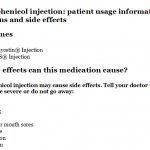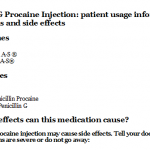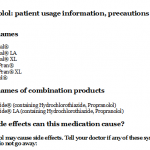
Tipranavir: patient usage information, precautions and side effects
Tuesday, May 30, 2017 by Gregory Van Dyke
http://www.naturalnewsreference.com/2017-05-30-tipranavir-patient-usage-information-precautions-and-side-effects.html

Tipranavir: patient usage information, precautions and side effects
Brand names
Aptivus®
What side effects can this medication cause?
Tipranavir may cause side effects. Tell your doctor if any of these symptoms are severe or do not go away:
-
diarrhea
-
weight loss
-
headache
-
stomach pain
Some side effects can be serious. If you experience any of these symptoms or those listed in the IMPORTANT WARNING section, call your doctor immediately or get emergency medical treatment:
-
fever, chills, cough, or other signs of infection
-
rash
-
redness, blistering, or peeling of skin
-
itching
-
throat tightness
-
shortness of breath
-
weakness, numbness and pain, in hands and feet
-
difficulty breathing or swallowing
-
muscle or joint pain or stiffness
Tipranavir may cause other side effects. Call your doctor if you have any unusual problems while taking this medication.
If you experience a serious side effect, you or your doctor may send a report to the Food and Drug Administration’s (FDA) MedWatch Adverse Event Reporting program online (http://www.fda.gov/Safety/MedWatch) or by phone (1-800-332-1088).
IMPORTANT WARNING:
Tipranavir (taken with ritonavir [Norvir]) may cause bleeding in the brain. This condition may be life-threatening. Tell your doctor if you have recently had surgery, or if you have recently been injured in any way. Also, tell your doctor if you have a bleeding disorder such as hemophilia (condition in which the blood does not clot normally). Tell your doctor and pharmacist if you are taking any of the following medications: anticoagulants (‘blood thinners’) such as warfarin (Coumadin, Jantoven), aspirin or products containing aspirin, cilostazol, clopidogrel (Plavix), dipyridamole (Persantine, in Aggrenox), eptifibatide (Integrilin), heparin, nonsteroidal anti-inflammatory drugs (ibuprofen, naproxen), prasugrel (Effient), ticlopidine, or tirofiban (Aggrastat). You should also tell your doctor and pharmacist if you are taking vitamin E, other than the amount contained in a regular daily multivitamin. If you need to get emergency medical treatment for any reason, be sure to tell all of the doctors who treat you that you are taking tipranavir. Call your doctor immediately if you experience unusual bruising or bleeding during your treatment with tipranavir.
Tipranavir (taken with ritonavir [Norvir]) may cause liver damage that may be life-threatening. Tell your doctor if you have or have ever had hepatitis (swelling of the liver caused by a virus), any other liver disease, or if you drink or have drunk alcohol. If you experience any of the following symptoms, stop taking tipranavir and call your doctor immediately: tiredness; weakness; flu-like symptoms; loss of appetite; nausea; vomiting; pain, ache, swelling, or sensitivity on your right side below your ribs; yellowing of the skin or eyes; dark (tea-colored) urine; or pale bowel movements.
Keep all appointments with your doctor and the laboratory. Your doctor will order certain tests to check your body’s response to tipranavir.
Talk to your doctor about the risks of taking tipranavir.
Why is this medication prescribed?
Tipranavir is used with ritonavir (Norvir) and other medications to treat human immunodeficiency virus infection (HIV). Tipranavir is in a class of medications called protease inhibitors. It works by decreasing the amount of HIV in the blood. Although tipranavir does not cure HIV, it may decrease your chance of developing acquired immunodeficiency syndrome (AIDS) and HIV-related illnesses such as serious infections or cancer. Taking these medications along with practicing safer sex and making other lifestyle changes may decrease the risk of transmitting the HIV virus to other people.
How should this medicine be used?
Tipranavir comes as a capsule and an oral solution (liquid) to take by mouth. If tipranavir is taken with ritonavir capsules or solution, it is usually twice a day with or without food. If tipranavir is taken with ritonavir tablets, it is usually twice a day with meals. Take tipranavir and ritonavir at around the same times every day. Follow the directions on your prescription label carefully, and ask your doctor or pharmacist to explain any part you do not understand. Take tipranavir exactly as directed. Do not take more or less of it or take it more often than prescribed by your doctor.
Do not take tipranavir without ritonavir.
Swallow the capsules whole; do not chew them. If you are unable to swallow the capsules, tell your doctor or pharmacist.
Tipranavir helps to control HIV infection but does not cure it. Continue to take tipranavir even if you feel well. Do not stop taking tipranavir without talking to your doctor. If you stop taking tipranavir or skip doses, your condition may become more difficult to treat. When your supply of tipranavir starts to run low, get more from your doctor or pharmacist.
Ask your doctor or pharmacist for a copy of the manufacturer’s information for the patient. Read this information carefully and ask your doctor or pharmacist if you have any questions.
Other uses for this medicine
This medication may be prescribed for other uses; ask your doctor or pharmacist for more information.
What special precautions should I follow?
Before taking tipranavir,
-
tell your doctor and pharmacist if you are allergic to tipranavir, ritonavir (Norvir, in Kaletra), sulfa medications, any other medications, or any of the ingredients in tipranavir capsules or solution. Ask your pharmacist if you are unsure if a medication you are allergic to is a sulfa medication. Also, ask your pharmacist for a list of the ingredients in tipranavir capsules or solution.
-
tell your doctor if you are taking any of the following medications or herbal products: alfuzosin (Uroxatral); cisapride (Propulsid) (no longer available in the U.S.); ergot medications for migraines such as dihydroergotamine (D.H.E. 45, Migranal), ergoloid mesylate (Hydergine), ergotamine (Ergomar, in Cafergot, in Migergot, others), or methylergonovine (Methergine); certain medications for irregular heartbeat including amiodarone (Cordarone, Nexterone, Pacerone), flecainide, propafenone (Rythmol), or quinidine (in Nuedexta); lovastatin (Altoprev), lurasidone (Latuda); midazolam by mouth; pimozide (Orap); rifampin (Rifadin, Rimactane, in Rifamate, in Rifater); sildenafil (Revatio) for treatment of pulmonary arterial hypertension, simvastatin (Zocor, in Vytorin); St. John’s wort; and triazolam (Halcion). Your doctor will probably tell you not to take tipranavir if you are taking one or more of these medications.
-
tell your doctor and pharmacist what other prescription and nonprescription medications, vitamins, nutritional supplements, and herbal products you are taking or plan to take. Be sure to mention the medications listed in the IMPORTANT WARNING section and any of the following: antifungal medications such as fluconazole (Diflucan), itraconazole (Onmel, Sporanox), ketoconazole (Extina, Nizoral, Xolegel), or voriconazole (Vfend); boceprevir (no longer available in the U.S.; Victrelis); bosentan (Tracleer); calcium-channel blockers such as diltiazem (Cardizem, Cartia, Diltzac, Taztia, Tiazac, others), felodipine, nicardipine, nisoldipine (Sular), or verapamil (Calan, Covera, Verelan, others); cholesterol-lowering medications (‘statins’) such as atorvastatin (Lipitor, in Caduet) and rosuvastatin (Crestor); clarithromycin (Biaxin, in Prevpac); colchicine (Colcrys, Mitigare, in Col-Probenecid); desipramine (Norpramin); disulfiram (Antabuse); estrogen hormone replacement therapy; fluticasone (Flonase, Flovent, in Advair, in Dymista); immunosuppressants such as cyclosporine (Gengraf, Neoral, Sandimmune), sirolimus (Rapamune), or tacrolimus (Astagraf, Envarsus XR, Prograf, others); medications for diabetes such as glimepiride (Amaryl, in Duetact), glipizide (Glucotrol), glyburide (Diabeta, Glynase, others), pioglitazone (Actos, in Actoplus Met, in Duetact, in Oseni), repaglinide (Prandin, in Prandimet), or tolbutamide; certain medications for erectile dysfunction including sildenafil (Viagra), tadalafil (Adcirca, Cialis), or vardenafil (Levitra, Staxyn); certain medications for seizures including carbamazepine (Carbatrol, Epitol, Equetro, Tegretol, Teril), phenobarbital, phenytoin (Dilantin, Phenytek), and valproic acid (Depakene); other medications for HIV including abacavir (Ziagen, in Epzicom, in Trizivir), atazanavir (Reyataz, in Evotaz), enfuvirtide (Fuzeon); etravirine (Intelence); fosamprenavir (Lexiva), lopinavir (in Kaletra), raltegravir (Isentress), and saquinavir (Invirase); meperidine (Demerol); methadone (Dolophine, Methadose); metronidazole (Flagyl, in Pylera); omeprazole (Prilosec, in Zegerid); quetiapine (Seroquel); rifabutin (Mycobutin); salmeterol (Serevent, in Advair); selective serotonin reuptake inhibitors (SSRIs) such as fluoxetine (Prozac, Sarafem, Selfemra, in Symbyax), paroxetine (Brisdelle, Paxil, Pexeva), or sertraline (Zoloft); telaprevir (no longer available in the U.S.; Incivek); and trazodone. Many other medications may also interact with tipranavir, so be sure to tell your doctor about all the medications you are taking, even those that do not appear on this list. Be sure to talk to your doctor or pharmacist before you begin taking any new medications during your treatment with tipranavir. Your doctor may need to change the doses of your medications or monitor you carefully for side effects.
-
if you are taking didanosine (Videx), take it 2 hours before or 2 hours after you take tipranavir.
-
if you are taking antacids, take them 1 hour before or 2 hours after you take tipranavir.
-
tell your doctor if you have or have ever had diabetes or high blood sugar; high blood cholesterol or triglycerides (blood fats); or an infection that comes and goes such as tuberculosis (TB), cytomegalovirus (CMV), herpes, Mycobacterium avium, shingles, or pneumonia.
-
you should know that some people with diabetes develop worsening of their diabetes while taking tipranavir. If you have diabetes, it is important to carefully monitor your blood sugar while taking tipranavir and call your doctor if your blood sugar becomes difficult to control. Your doctor may need to change your diabetes medication or prescribe new medication to control your blood sugar.
-
tell your doctor if you are pregnant, plan to become pregnant, or are breastfeeding. If you become pregnant while taking tipranavir, call your doctor. Do not breastfeed if you are infected with HIV or are taking tipranavir.
-
you should know that tipranavir may decrease the effectiveness of hormonal contraceptives (birth control pills, patches, rings, and injections). You will need to use another method of contraception to prevent pregnancy while taking tipranavir. Talk to your doctor about other ways to prevent pregnancy while you are taking this medication.
-
if you are having surgery, including dental surgery, tell the doctor or dentist that you are taking tipranavir.
-
plan to avoid unnecessary or prolonged exposure to sunlight and to wear protective clothing, sunglasses, and sunscreen. Tipranavir may make your skin sensitive to sunlight.
-
you should know that your body fat may increase or move to different areas of your body such as the back of your neck and upper shoulders (‘buffalo hump’), stomach, and breasts. Your body may lose fat from your arms, legs, face, and buttocks. Talk to your doctor if you notice any of these changes in your body fat.
-
you should know that you may experience hyperglycemia (increases in your blood sugar) while you are taking this medication, even if you do not already have diabetes. Tell your doctor immediately if you have any of the following symptoms while you are taking tipranavir: extreme thirst, frequent urination, extreme hunger, blurred vision, or weakness. It is very important to call your doctor as soon as you have any of these symptoms, because high blood sugar that is not treated can cause a serious condition called ketoacidosis. Ketoacidosis may become life-threatening if it is not treated at an early stage. Symptoms of ketoacidosis include dry mouth, nausea and vomiting, shortness of breath, breath that smells fruity, and decreased consciousness.
-
you should know that while you are taking medications to treat HIV infection, your immune system may get stronger and begin to fight other infections that were already in your body. This may cause you to develop symptoms of those infections. If you have new or worsening symptoms at any time during your treatment with tipranavir, be sure to tell your doctor.
What special dietary instructions should I follow?
Unless your doctor tells you otherwise, continue your normal diet.
What should I do if I forget a dose?
Take the missed dose together with ritonavir as soon as you remember it. However, if it is almost time for the next dose, skip the missed dose and continue your regular dosing schedule. Do not take a double dose to make up for a missed one.
What should I know about storage and disposal of this medication?
Keep this medication in the container it came in, tightly closed, and out of reach of children. Store unopened bottles of tipranavir capsules in the refrigerator. Store opened bottles of tipranavir capsules at room temperature, and away from excess heat and moisture (not in the bathroom). Store tipranavir solution at room temperature. Do not refrigerate or freeze tipranavir solution. Mark the date you open the bottle of tipranavir on the label; if the medication is not used within 60 days, dispose of the remaining medication.
Unneeded medications should be disposed of in special ways to ensure that pets, children, and other people cannot consume them. However, you should not flush this medication down the toilet. Instead, the best way to dispose of your medication is through a medicine take-back program. Talk to your pharmacist or contact your local garbage/recycling department to learn about take-back programs in your community. See the FDA’s Safe Disposal of Medicines website (http://goo.gl/c4Rm4p) for more information if you do not have access to a take-back program.
In case of emergency/overdose
In case of overdose, call your local poison control center at 1-800-222-1222. If the victim has collapsed or is not breathing, call local emergency services at 911.
What other information should I know?
Keep all appointments with your doctor and the laboratory. Your doctor will order certain lab tests to check your body’s response to tipranavir.
Do not let anyone else take your medication. Ask your pharmacist any questions you have about refilling your prescription.
It is important for you to keep a written list of all of the prescription and nonprescription (over-the-counter) medicines you are taking, as well as any products such as vitamins, minerals, or other dietary supplements. You should bring this list with you each time you visit a doctor or if you are admitted to a hospital. It is also important information to carry with you in case of emergencies.
Why is this medication prescribed?
How should this medicine be used?
What special precautions should I follow?
What special dietary instructions should I follow?
What should I do if I forget a dose?
What side effects can this medication cause?
What should I know about storage and disposal of this medication?
Tagged Under: Tags: chemical medicine, medication, Pharma, Prescription Medicine





